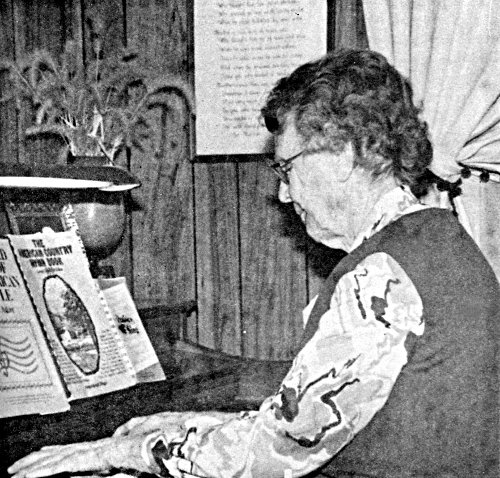
Updated May 31, 2010.
Ada Waterfield interviewed by Barbara Doll. Published in the Currituck High School Currituck Sounder. Spring 1984 edition.
"We made it . . .," Mrs. Ada Waterfield asserts, smiling through determined eyes, slightly dimmed by her great age of ninety. She stands quite erect in spite of the faint twist in her slender fingers which reveal arthritis. These are the only indications of the forces of age that silently erode her active, strong-willed nature. Any force would have to take her unaware; a face-on foe would never stand a chance.
This is my dear old neighbor, friend from childhood, and a natural choice for my interview. She is readily available to contribute to education, recall history, and give guidance. She feels it a duty. Faced with choices limited by fate, she follows paths clearly defined by her training and beliefs.
"Everyone went to church," she states flatly. To this strong central theme of church and family she credits her strength and survival. Her love for both is steady and unyielding throughout our conversation. After seventy—eight years she is still grieved by her childhood loss of a father she loved dearly. Her father's death brought her family closer together. lf not for her strong-willed and inventive mother they may not have remained together.
At first, she said, there wasn't any transportation, except by horse and cart or wagon because we had no road to connect the Island to Virginia. Later residents of the island built a road to go across the marsh. That's the way a doctor used to come on horseback. There were women who were midwives and people who made medicines of herbs. I had an aunt who made all our cough syrup and she made a special salve for Papa's tetter (dry cracked skin with blisters) on his hands. I remember my sister had pneumonia one winter and they put her in a cast of mustard. My mother and aunt tended to her. I don't know why, but she didn't die. She was very ill.
My sister used to love to use axes, knives, and hatchets. She was always in the yard working on something. One time my brother put his hand on the chopping block and she cut off one of his fingers. Our neighbor, so they told me, stuck it back on with varnish! To this day you can see a ridge around it. It's funny looking, but it‘s still on there.
There was no electricity, no organs or pianos, and I never saw a bathroom till I was nearly grown. My daddy was one of the first people around to get an organ. There were seven men that had girls and they wanted to hire a music teacher to board on the Island and teach music to their daughters. My sister was one of the girls and she was very good. In fact my whole family was musical. Papa used to lead the singing at church with a tuning fork. I played piano for the church for a long time and now my daughter does it.
The standard of living has changed so much. Farmers used to grow just about everything people ate. No one left the Island for goods because there was no way to go. Later in years there was a boat, The Currituck, that carried freight from Norfolk to the south end of Knotts Island to Poplar Branch and back to Norfolk. There also was a colored man they called a huckster. He went around and would take orders for things from Norfolk and he would go by horseback over to Munden Point, where there was a train that ran to and from Norfolk. The first book I ever got when I was in school was ordered from him by my mother.
Everybody worked, the children went to school, and everyone did all of his own work. On Sundays everybody went to church. You just cou1dn't find anybody home on Sunday. I've seen so much change in this. I'd like to see people take more interest in the church work because of what it meant to me. If we could ever bring back that 'Old Time Religion' that young people today don't know anything about. They were some of the happiest days I can remember. They were not educated people but they were real christians. Young peop1e's time is taken up so much with school that they just don't have time for church.
Miss Ada is a very special person to me and many other people. She
has
suffered and survived many tragedies, and yet she still strives
forward. She probably always will.